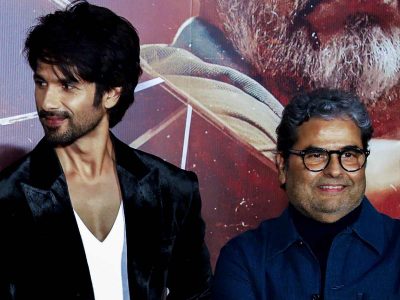For Mushtaaque Ali Ahmad Khan, a celebrated Kashmiri theatre artist and filmmaker, Delhi has been more than just a city—it has been a launchpad for creativity, opportunity, and artistic exploration. With a career spanning decades, Khan credits Delhi for shaping his journey in theatre and film, calling it his “second home” and a place where his passion for the arts flourished.
“After Kashmir, the city I love most is Delhi. I have spent a significant part of my life there. The food, culture, and vibrant people make it my favourite place,” said Khan.
He highlighted how Delhi has been instrumental in shaping his career. “Delhi has played a pivotal role in my career, especially in theatre, TV, and film festivals. I regularly visit the city to attend theatre shows, festivals, and film events.”
Also read: Vidhu Vinod Chopra took us on a foreign tour after Mission Kashmir success: Atul Tiwari
Television roots in Delhi
Khan began his television career with Doordarshan, which shares a strong connection with Delhi. “My involvement with TV started at DD Kashir, which had its head office at Mandi House in Delhi. I worked there for over 22 years, from 1988 to 2010. Later, I also contributed to DD Urdu between 2012 and 2014,” he said.
Connection with Delhi’s cultural landscape
At 63, Khan remains deeply involved with Delhi’s esteemed cultural institutions, such as the National School of Drama (NSD), Sangeet Natak Akademi, and the Ministry of Culture. These platforms have been crucial to his theatre activities and his group, Actors’ Creative Theatre (ACT).
“My work is deeply rooted in Delhi’s cultural ecosystem. I am constantly collaborating with NSD, Sangeet Natak Akademi, and other institutions for theatre activities. I also receive immense support for my film festival, the Kashmir World Film Festival (KWFF), from organisations such as the Directorate of Film Festivals (DFF), International Association of Women in Radio and Television (IAWRT), State Bank of India (SBI), Federation of Indian Chambers of Commerce & Industry (FICCI), and other prestigious bodies based in Delhi,” Khan added.
NSD: A constant inspiration
Khan holds NSD in high regard. “NSD has been a major source of inspiration for me. For nearly three decades, I have visited Delhi regularly to attend plays at NSD, particularly during the ‘Bharat Rang Mahotsav.’ Whenever I am in Delhi, a visit to NSD is a must— whether it is for interacting with the director, faculty, and other theatre professionals or to browse their bookstore for the latest books on theatre,” he said.
He fondly remembered Mandi House, which he described as the heart of Delhi’s theatre scene.
“Mandi House is synonymous with Delhi for me. Apart from NSD, I frequently visit theatres and cultural venues like Triveni, Shri Ram Centre, Kamani Auditorium, Little Theatre Group, and Meghdoot. These places are buzzing with creativity, offering a space for artistes to perform and interact.”
Khan also highlighted the vibrancy of Mandi House, where aspiring artistes often rehearse in open spaces. “I’ve seen theatre groups practising in every nook and cranny around Mandi House, which speaks volumes about the enthusiasm and dedication of Delhi’s theatre community,” he added.
Theatre in Kashmir
Turning to his roots, Khan reflected on the challenges facing theatre in Kashmir. While the region has a rich theatrical tradition, socio political issues have hindered its growth.
“Theatre in Kashmir is undoubtedly growing, but honestly, it has not yet reached the level where it should be. There are multiple factors at play, including an orthodox society and the political instability in the region,” he said.
However, he praised the dedication of Kashmir’s theatre enthusiasts. “Despite the difficulties, there are a few passionate theatre activists who are striving to elevate the status of theatre in our society. Their efforts are truly commendable,” he remarked.
Also read: Was nervous to work with Ajay Devgn in Singham Again: Farhana Bhat
Supporting Kashmir’s film industry
Khan also lauded the J&K government for introducing the J&K Film Policy, which has eased the filmmaking process in the region. “I am deeply grateful to both the central and J&K government for launching the J&K Film Policy and establishing the J&K Film Development Corporation. This move has been hailed by film professionals across the region and the rest of the country,” he said.
“Now, filmmakers can easily obtain film permissions, and there are also subsidies available to support their projects,” he said.
Empowering local performers
As the founder of ACT, established in 1976, Khan has provided a platform for Kashmiri thespians to thrive. “ACT was established to give local theatre artistes a platform and help them become economically stable through regular plays and performances,” he explained.
Khan has also championed cinema in the region with the Kashmir World Film Festival (KWFF), which he launched in 2017. The festival, held in a region devoid of cinema halls, has successfully hosted four editions, showcasing world-class films.
“KWFF has been a unique platform, bringing international films to Kashmir and offering young filmmakers a chance to showcase their work to a global audience,” Khan said.
The festival has attracted notable names like Tabu, Madhur Bhandarkar, and Rajit Kapur. “We aim to provide young filmmakers with an opportunity to present their films to the world and to bring international cinema to the beautiful valley of Kashmir,” Khan stated.
A distinguished career
With over fifty leading roles in stage plays across languages like Hindi, Urdu, Punjabi, and Kashmiri, Khan’s career is a testament to his versatility. He has performed in cities including Srinagar, Jammu, and Allahabad, and since 2005, he has directed more than 35 plays in Kashmiri and Urdu.
His artistic contributions have earned him over twenty prestigious awards, underscoring his impact on theatre and film.
Khan continues to champion the arts in Kashmir, striving to promote and preserve its cultural heritage while nurturing emerging talent. His dedication ensures that his legacy will inspire future generations of performers.




